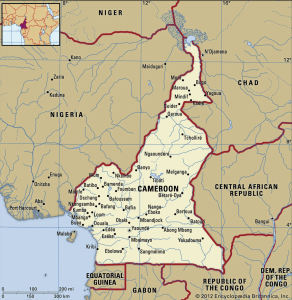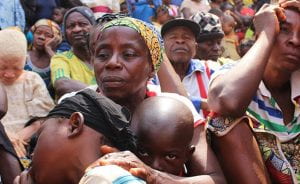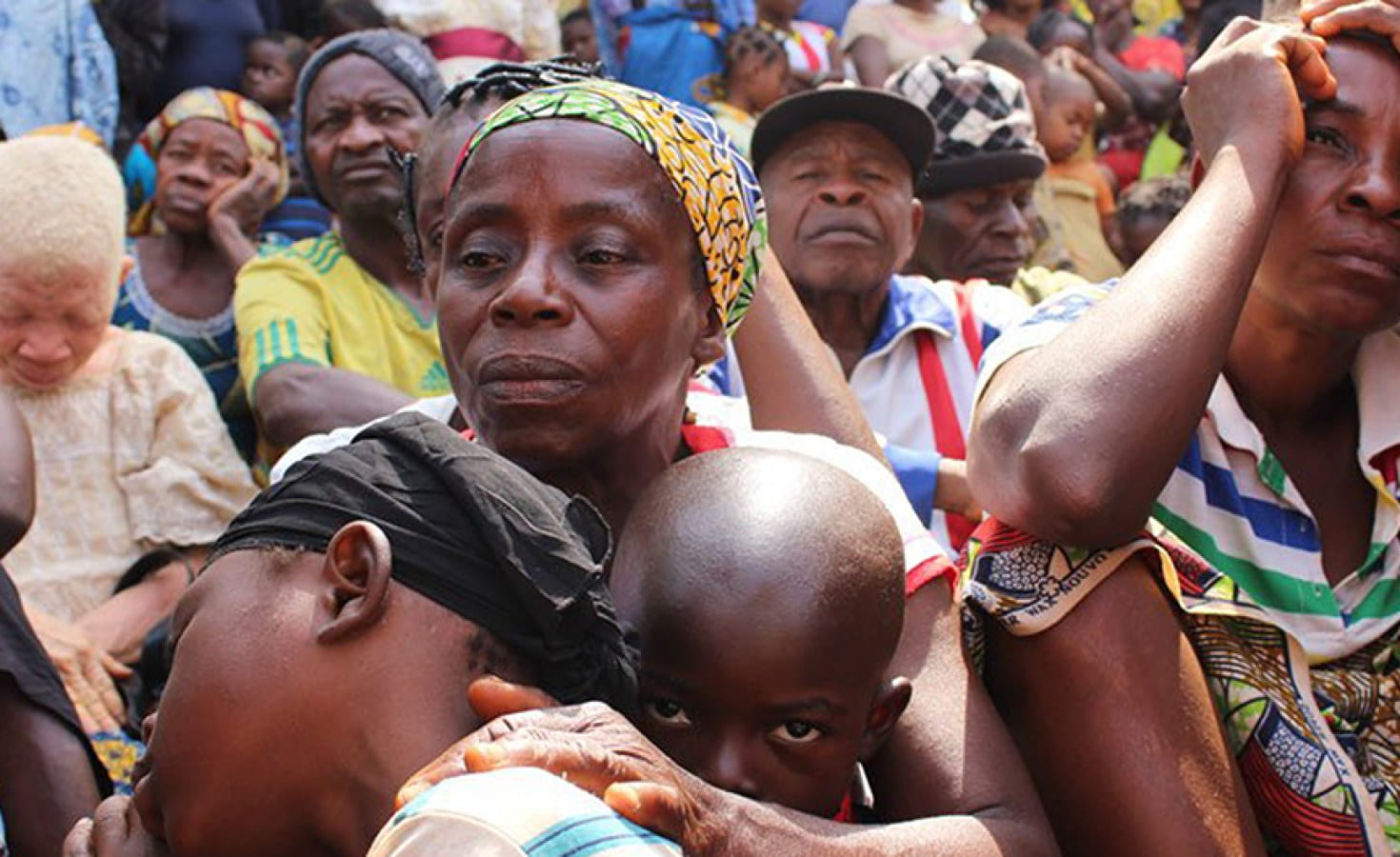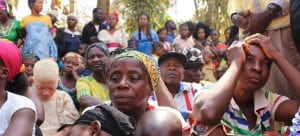Cameroon, once a bastion of peace and tranquility, is now a nation beset with a series of violent and armed conflicts. Since late 2016, an armed conflict between the state defense forces of Cameroon and the non-state armed groups (NSAGs) of Southern Cameroons’ has ravaged the country. In the last six years, there have been more than 6,000 deaths, 765,000 internally displaced persons (IDPs), and 70,000 registered refugees in neighboring Nigeria, with approximately 2.2 million people in need of humanitarian aid. The Norwegian Refugee Council has referred to the conflict as one of the most neglected in the world. The long-term human capital consequences of this conflict are enormous.
A more comprehensive background of the armed conflict and humanitarian crisis in Southern Cameroons can be found in a previous IHR blog post, “Cameroon, a Nation Divided”.

It is against this backdrop that the Cameroon Humanitarian Relief Initiative (CHRI) in partnership with the Institute of Human Rights (IHR) co-hosted an international webinar, “Updates on the Humanitarian Crisis from the Ongoing Armed Conflict in the Southern Cameroons” on the 18th of October, 2022. The aim of this event was to discuss the current humanitarian crisis from a multi-perspective panel. The speaker biographies can be found at the bottom of this blog post.
Excerpts from this webinar were edited and woven together for this blog post. The full recording of the webinar is available on request by contacting ihr@uab.edu.

Overview
What are the current humanitarian needs for Internally Displaced Persons (IDPs) in Southern Cameroons?
Atim Evenye: The current context and the magnitude of the ongoing crisis in the Northwest and Southwest regions remain tense. There is continuous violence in targeted areas. We have the destruction of properties. We have abductions and kidnappings of both community people and administrators. We have killings and local arrests. We have continuous attacks on schools and students. Humanitarians face threats and direct [armed] attacks. [These are carried out] by both parties, the non-state actors and the state defense forces.
The population [has] really [been] under duress and stress for over six years.
Food Security: Atim Evenye: When it comes to the current needs for IDPs, at the moment, I would say food security remains one of those outstanding needs. Especially in the rural areas, because these IDPs have fled their place of abort. They don’t have access to their farms. [As such,] they don’t have the economic capital [for even] daily subsistence. So, there is a lot of dependencies now on family members, [or] world food programs, and other humanitarian organizations bringing food assistance in the area.
Education Accessibility: Atim Evenye: There is a strict restriction around education. In [the rural areas] of the Northwest and Southwest regions, we have children who have not been able to go to school until date. In urban areas, there is a possibility of schools for those who can afford it. Currently, in our zone in the Northwest and Southwest regions, we have lost one month [of school this term], because we are only starting now. So, it becomes challenging on how to catch up. There’s a need for accelerated learning. [Additionally,] teachers have been abducted [and] schools have been burned. [To add to that,] there is a lot of psychological trauma, [as] many children have witnessed or experienced violence firsthand. Both the state and non-state actors [are] not conscious of the impact their actions are having on children. The government doesn’t want to hear about community schools as prescribed by the separatist. So, it’s really very challenging to access education.
Dr. Emmanuel Nfor: Education is one of the issues at the origin and at the core of the crisis, and formal education has been used by NSAGs, [the non-state armed groups], as a political instrument. NSAGs have advocated and enforced a “no school policy”, leading to public school closures for the past four years in many areas. More than fifty percent of threats against buildings in communities have been directed against schools, and many school buildings have been taken over by organized armed groups. Accessing education in emergency services, or going to school in such a volatile environment, is proven to be risky for children, as well as for teachers. Pupils who were in school in most rural areas have dropped out, some joining armed groups, others displaced, and some have outgrown their ages for the classes in which they were and cannot continue. Many parents have lost their means of livelihood and are unable to sponsor their children in school. Despite repeated calls from humanitarian and human rights organizations for education to be depoliticized, schools have been burnt, teachers and students intimidated, kidnapped, and even killed, and some have seen their hands chopped off by members of armed groups.
Gender-based violence (trigger warning): Atim Evenye: We see [a great deal] of gender-based violence. In certain assessments we have conducted, for example, [many of these] young girls in rural areas are not able to go to school. What are they left to do? There is a lot of harassment, rape, and [sexual assaults]. They’re looking for five hundred francs CFA, that’s like one dollar, to [be able to just buy] food to eat. So then, they depend on young men to give them that money. And at the end of the day, they [get pregnant and become] teenage mothers. The whole cycle is really detrimental, it’s a really difficult one.
Dr. Emmanuel Nfor: Sexual violence is rampant, as a direct consequence of the crisis but also due to decreasing livelihoods, negative coping mechanisms, and lack of protection structures. The boy child is an endangered species, at risk of accusation and arbitrary killing from GFs [state defense forces], and forced recruitment by the NSAGs. There are no specific programs by both UN agencies and Internal bodies that address the needs of the boys.
Housing: Dr. Emmanuel Nfor: If we look at where the IDPs in particular are, we have IDPs that are living in the rural areas, in the bushes. We have those living within host communities. We have some that have been able to rent. [But if] they are able to pay for accommodation, [there are] a lot of difficulties because they want them to pay upfront, and they cannot do it. In all three groups, they lack basic WaSH and health services, NFIs [non-food items], and protection from natural hazards. Those who fled to other regions face stigma and severe protection risks related to exploitation, and socio-economic vulnerabilities including extortion, sexual exploitation, and child labor.
Healthcare: Atim Evenye: The next principal need I would say is around healthcare. In recent times we have [had] heath centers burned, and the staff attacked. So, it’s really challenging. Statement needs to be completed, even before the crisis, access to health care has been a serious challenge, especially in rural areas. And then, currently, with the crisis, it’s even more exacerbated. It becomes difficult now [for] humanitarians on the ground who are trying to meet the needs of these people. Take, for example, Doctors Without Borders. They have [had] to put their activities on the hold because they had issues around access [and safety] of their staff.
Dr. Emmanuel Nfor: [There is a lot of] healthcare [needs] for the vulnerable. [Safe practices in regard to] water, sanitation, and hygiene are not being followed. People who live in rural areas don’t have a good source of water. But they could be educated on the fact that even though your source of water is doubtful, you could take it, you boil it, you purify it, or you do something to make it [potable]. That education, they don’t have, or the chemicals for water treatment. Additionally, there is a lack of emergency medical and psychological units, to provide emergency care to the wounded and psychosocial support to those traumatized by the violence. We can educate people on how to prevent simple infections. How can you prevent diarrhea infection? How can you prevent malaria? If this education is done, it could be [one] way to [improve basic healthcare].
Healthcare, which is supposed to be a protected area, unfortunately, has not been the case in this conflict. We have had health centers closed; more than fifty percent of the health centers in rural communities have been closed. Not only the health centers, [but] the health workers do not feel comfortable staying there. So, a lot of them have abandoned [the centers]. The [people] left in these communities cannot access healthcare. Women cannot access antenatal clinics. Vaccinations [are] not being done, and thousands of children are at risk of contracting common vaccine-preventable infections.
The population has been abandoned to themselves.
Health centers that are open in semi-urban and urban areas are overwhelmed by people who have [been forced by the conflict to flee]. And what’s worse is that most of those who have [fled] do not have the means to pay for the treatment. We have some health centers that have accumulated huge unpaid bills because those who access healthcare cannot afford to pay those bills. For the facilities that are open, IDPs cannot afford to pay for the treatment that is given to them.
We have [also] had cases of drugs and other medical equipment [being] seized along the way by organized armed groups. So, it’s difficult to render care because the drugs and medical supplies do not reach the vulnerable in the hard-to-reach areas. Free supply of drugs and medical equipment is disturbed by locked downs, roadblocks, and/ or are seized at gunpoint.
Then the last very worrying thing is that healthcare workers are being attacked or kidnapped for ransom. A lot of them have been attacked both by the non-state actors and by the state forces; [health workers are] kidnapped by the non-state actors and/or arrested by the [state forces]. So, it is not safe [from] either side. They see you as collaborating with the other, and [so the question is] whether you should treat wounded combatants or not. According to the healthcare regulation, we take any wounded persons as patients. But unfortunately, when these [combatants are] treated, we [the healthcare workers] are blamed. The non-state actors blame you for treating the state forces. The state forces blame you for treating the non-state actors. It’s really a dilemma in which we are in.
Future Directions:
Looking towards the future, are there any resolutions to the humanitarian crisis in Southern Cameroons that you can think of that can be implemented at this point?
Dr. Emmanuel Nfor: I think the first thing we need to consider for the humanitarian crisis is that we need to speak the truth.
We need to make a truthful appraisal of what is happening on the field. Address the needs. For example, we are told that the crisis in Cameroon is one of the least funded in the world. Why? Because the data and the reposting are for some reason concealed.
So, if we must be able to go forward with the humanitarian situation, we need to know how many people are living in the bushes, how many are living in host communities, in what conditions are they living, and be able to address it. [These] figures are often contested, they say the number is lower, or they want to sway the number for their gain. So, we must start with you right data. If we have the right data on needs, it will be possible to see where the solutions should come from.
Possible resolution options, specifically for the humanitarian crisis, could consider the following:
-A community-based approach to raise awareness of protection risks in the community and identify and support community-based solutions.
-Advocate for access to civil documentation, especially birth certificates, to avoid a stateless generation and mitigate protection risks associated with a lack of civil documentation.
-Support community mediation of localized conflicts to reinforce the dialogue between host communities and IDPs and avoid tensions within the communities.
-Advocate with parties to the conflict to respect the protection rights of communities, and respect International Humanitarian Laws.
-Finding durable solutions for IDPs intending to stay in their host communities, like those who have established businesses in the new areas.
-Shelter support in rural areas as a high percentage of households live in tents or informal collective shelters
Atim Evenye: When it comes to setting strategies that we can use to resolve this conflict, I would say it’s imperative, for the powers that be to consider the roles of different parties in the conflict. There is a need for parties in this conflict to come to the table and talk. There is a need for dialogue. There is a need for unity. We need to have a unity of purpose, to push our agenda in one voice.
True is the fact that they have been the major national dialogue, [there] have been consultation meetings and other forms of dialogue in smaller circles. But the question is, during this dialogue are the needs of the different parties considered?
For example, we have women who have suffered a lot as a result of this conflict. But at the same time, we have that arm of women who are also seeking solutions on how to resolve the conflict. Women are now spearheading and speaking for themselves. And I think, there is a need to give a listening ear to what the women are saying because I think time in memorial, women have always demonstrated that ability to resolve conflict. So, one way to consider the proposals that women are giving here in Cameroon.
Secondly, there is a need to give academia and research a place. There are a lot of people in the academic who are gathering data, but the fear around it is the dissemination of this information. The administrative system is such that once you do a publication that is not supportive of what is happening, you get targeted. And by both sides. Thus, we try to be balanced in all information dissemination. There is a need for that deliberation and freedom of speech, especially in the area of academia. People should not be afraid to publicize or to make public the research and the results of what they have found in the field. So that’s another way that can be an added value to the approaches to conflict resolution.
Also, there is a need to consider the root causes. The conflict did not just start like that, it degenerated along the line. So, there is a need to go back to the drawing board and understand what pushed the Southern Cameroonians to arrive at this point. What are the different trends that have been changing through the crisis?
When it comes to how to resolve the humanitarian crisis, I think the humanitarian needs are more than what the humanitarian organizations can do, funding is very limited. It’s obvious that humanitarians cannot meet all the needs. So where should we turn to? We should turn to other actors who can bring assistance. We have development actors who can bring resilient, [long-term, skills-building] projects so that the communities will not be too dependent. The people of the Northwest and Southwest have never been those who are dependent on handouts.
They are people who are hard-working. We hear the aches of people wanting to be self-sustaining. They want to just be, to go back and be what they had been doing [before the conflict].
Dr. Emmanuel Nfor: If we don’t put away falsehood, if we don’t speak the truth and have the right data and have the right information about what is going on, on the ground, we will continue for many more years doing much but with very little impact.
The people of Northwest and Southwest can lead by themselves. These are hard-working people. They just need to be empowered, to go back to where they have lived before. There are many people who are longing to go back home, but the problem is that they go to homes that have been burnt. They go to farms that have been abandoned. They go to be reminded of the horror. So, we need psychological treatment and support. We need some form of equipping them to be able to cope with what they have lost. We should be able to end the hostilities and give people the opportunity to go back home.
So, we should rather empower them, than continue to give them aid. Let peace reign, [so that] we can empower them to reveal what they have lost and then see how they can bring up that life again. [Then] we can go forward. But hostilities should cease, and we should speak the truth; to face each other face-to-face and speak the truth.
Speaker Biographies
Atim Evenye Niger-Thomas, received a Ph.D. in Student Conflict Management and Peacebuilding at the International University of Applied sciences for Development (IUASD) Sao Tome in partnership with IPD Yaoundé. Since 2016, Atim Evenye has worked and grown in different roles at the Authentique Memorial Empowerment Foundation (AMEF). Currently, she holds the position of Assistant Director and trainer for Humanitarian Negotiation. Under this supervision, AMEF has grown to be one of the leading humanitarian organizations in the Southwest Region. AMEF runs four core programs namely, Education and Child Protection (ECP), Economic Development and Livelihood (EDL), Gender, Protection and Peace (GPP), Health/Nutrition/ WASH (HNW).
Dr. Nfor Emmanuel Nfor, holds a PhD in Medical Parasitology from the University of Yaounde I, Cameroon. In February 2017, he joined the Cameroon Baptist Convention Health Services (CBCHS), as the Malaria Focal Point. While working with the CBCHS, he attended a Peer Review Workshop on Humanitarian Negotiation organized by the Centre for Competence in Humanitarian Negotiation (CCHN) Geneva. After many other online courses, and several National and International Conferences, he was appointed Trainer and Advisor of Humanitarian Projects within the CBCHS. In this capacity, he coordinated projects executed by the CBCHS with funding from WHO, UNICEF, and UNFPA. He has been at the forefront of Humanitarian activities within the CBCHS during the ongoing sociopolitical crises in the North West and South West Regions of Cameroon, working closely with the Cameroon Humanitarian Response Plan.
This is the second in a series of blog posts that will look further into the conflict in Cameroon. Each month a humanitarian need and/or organization working in response to the humanitarian crisis will be featured on the UAB Institute for Human Rights’ blog.




